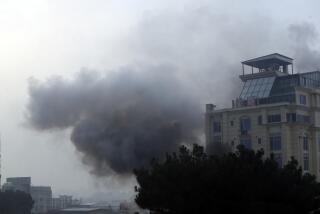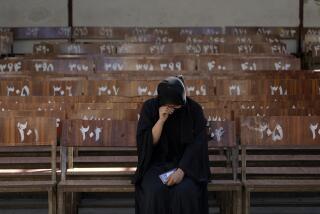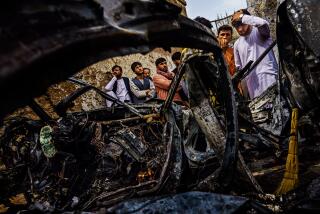Kabul residents angry, fearful after string of deadly attacks
When the shooting started, the lunchtime crowd at Musa Burger scattered. The tea-seller abandoned his burning brazier. The kitchen worker dropped a half-peeled onion. The beggar woman in a faded blue burka scooped up her few tattered bank notes and ran.
Insurgents armed with rockets and heavy machine guns had taken over a half-finished high-rise on Kabul’s busy Abdul Haq traffic circle, beginning a siege of the U.S. Embassy that would continue for 20 hours.
Scarcely a week later, this same small slice of urban landscape — which includes a gaudy wedding hall, a dimly lighted snooker parlor and a run-down car wash shadowed by a billboard for an energy drink called Hell — was already caught up in the next convulsion of violence. This time, it was a suicide bombing that killed a former Afghan president at his nearby home.
Kabul once considered itself relatively insulated from the violence that leapfrogs daily from one part of Afghanistan to another. But a series of attacks over the last four months has left many in the capital feeling vulnerable, jittery and angry — at the insurgents who seemingly strike at will, at Westerners whose presence makes targets of all those living here, and at their own government, which few consider capable of keeping them safe.
The growing violence in Kabul, the seat of government and symbolic heart of the country, poses a conundrum for the U.S. and its NATO allies. American officials blame the attacks on the Haqqani network, a Taliban offshoot based across the border in Pakistan. On Thursday they accused Pakistani intelligence agents of collusion in the embassy attack.
Overall, U.S. officials have consistently sought to play down the strategic importance of such attacks, saying they will not affect plans to hand over security responsibilities to Afghan forces in 2014 and wind down the Western combat mission.
But to Afghans who see their lives and livelihoods increasingly at risk, American assertions that such strikes are a sign of desperation on the insurgents’ part ring hollow.
“It’s like a drum that is beating faster and faster,” said Amir Mohammed, who runs a small stand that sells paint sealant, decals and air freshener to car-wash clientele. “First one thing happens, and then another, and another. No one in the city feels safe anymore.”
In addition to this month’s strike on the U.S. Embassy and the adjacent NATO headquarters, targets since June have included a heavily guarded hilltop hotel, which was stormed by a squad of gunmen and bombers, and a well-fortified British cultural center, where frightened staffers holed up in a “safe room” during an hours-long insurgent assault last month.
Adding to the climate of fear were the brazen in-home assassinations of two senior government officials: Jan Mohammed Khan, a close aide to President Hamid Karzai who died July 17 in a bombing, and Burhanuddin Rabbani, a former Afghan president. Rabbani, Karzai’s main negotiator with the Taliban, was killed Tuesday by a suicide bomber who hid explosives in his turban.
On Friday, a police checkpoint slowed passing traffic to a crawl as mourners streamed into the area to pay respects to Rabbani. Once again, the shops and businesses were shuttered, this time for three days of mourning.
U.S. Ambassador Ryan Crocker, a veteran diplomat who took up his post this summer, infuriated many in the capital when he declared that the Sept. 13 attack on the embassy launched from Abdul Haq circle was “not a very big deal.” It was one of several strikes across Kabul that day in which 17 people were killed — all Afghans.
Crocker was speaking in terms of the larger insurgent threat to the U.S. diplomatic and military mission, but his phrasing rankled Afghan families who for hours could hear explosions and gunfire just outside their darkened homes.
“We were awake all night, astounded and frightened,” said Ahmad Shoaib, 30, who lives with his extended family in a building within sight of the unfinished multistory structure taken over by the insurgents. “From our windows we could see the two sides exchanging fire, and hear the noise of fighting. The children were terrified.”
Still, Shoaib counted himself lucky to be able to comfort his wife and 2-year-old son throughout the ordeal. Some family members were trapped elsewhere in the battle zone, unable to make their way home.
Pakistan has angrily rejected charges by Adm. Michael G. Mullen, chairman of the U.S. Joint Chiefs of Staff, that the Haqqanis are a “veritable arm” of Pakistan’s Inter-Services Intelligence directorate, or the ISI.
In Kabul, many fear that the rancorous U.S.-Pakistani dispute will result in even more strikes in the capital if Pakistan seeks to drive home the point that it will not be dictated to by Washington.
The gnawing uncertainty disrupts daily life; some people say anxiety is leading them to alter long-cherished routines.
One university professor has reluctantly stopped taking after-dinner strolls. Shoaib, the young father, says he is much more likely now to stay home with his family on days off, rather than considering an outing on a sunny early-autumn day.
Among capital residents, living close to any foreign installation is cause for extreme nervousness, even though such environs are likely to be heavily guarded. Civilians living nearby in ordinary homes, rather than those inside the fortified Western structures, are the most likely to be hurt or killed in an insurgent attack.
“We draw the fire meant for them,” said Jamal Noori, who owns a building that was half-wrecked during an Aug. 19 assault on the British Council, which left nine people dead. “Wherever they are, that is where the danger is.”
Back at Abdul Haq circle, the Dunya wedding hall was counting up its financial loss from a lavish wedding party with 1,500 guests that had to be canceled because of the embassy siege. Mirwais Khotak, who runs Musa Burger, gestured around his near-empty establishment. No one, he said, feels like lingering over lunch now.
“It affects us every day, wondering what comes next,” said Mohammed Sabar Momand, proprietor of the snooker parlor next door. “Yet it all seems very familiar, as well. And maybe that is the most frightening thing.”
Special correspondent Aimal Yaqubi contributed to this report.
More to Read
Start your day right
Sign up for Essential California for news, features and recommendations from the L.A. Times and beyond in your inbox six days a week.
You may occasionally receive promotional content from the Los Angeles Times.






